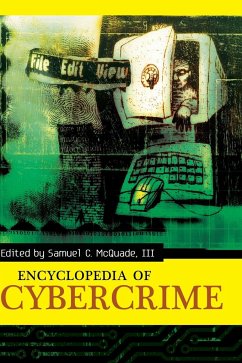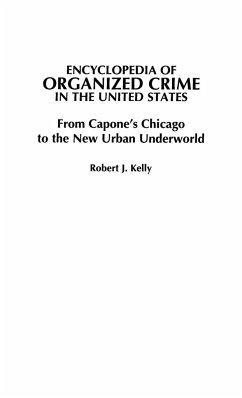
Encyclopedia of Cybercrime
Versandkostenfrei!
Versandfertig in 1-2 Wochen
47,99 €
inkl. MwSt.

PAYBACK Punkte
24 °P sammeln!
There are today no more compelling sets of crime and security threats facing nations, communities, organizations, groups, families and individuals than those encompassed by cybercrime. For over fifty years crime enabled by computing and telecommunications technologies have increasingly threatened societies as they have become reliant on information systems for sustaining modernized living. Cybercrime is not a new phenomenon, rather an evolving one with respect to adoption of information technology (IT) for abusive and criminal purposes. Further, by virtue of the myriad ways in which IT is abus...
There are today no more compelling sets of crime and security threats facing nations, communities, organizations, groups, families and individuals than those encompassed by cybercrime. For over fifty years crime enabled by computing and telecommunications technologies have increasingly threatened societies as they have become reliant on information systems for sustaining modernized living. Cybercrime is not a new phenomenon, rather an evolving one with respect to adoption of information technology (IT) for abusive and criminal purposes. Further, by virtue of the myriad ways in which IT is abused, it represents a technological shift in the nature of crime rather than a new form of criminal behavior. In other words, the nature of crime and its impacts on society are changing to the extent computers and other forms of IT are used for illicit purposes. Understanding the subject, then, is imperative to combatting it and to addressing it at various levels. This work is the first comprehensive encyclopedia to address cybercrime. Topical articles address all key areas of concern and specifically those having to with: terminology, definitions and social constructs of crime; national infrastructure security vulnerabilities and capabilities; types of attacks to computers and information systems; computer abusers and cybercriminals; criminological, sociological, psychological and technological theoretical underpinnings of cybercrime; social and economic impacts of crime enabled with information technology (IT) inclusive of harms experienced by victims of cybercrimes and computer abuse; emerging and controversial issues such as online pornography, the computer hacking subculture and potential negative effects of electronic gaming and so-called computer addiction; bodies and specific examples of U.S. federal laws and regulations that help to prevent cybercrimes; examples and perspectives of law enforcement, regulatory and professional member associations concerned about cybercrime and its impacts; and computer forensics as well as general investigation/prosecution of high tech crimes and attendant challenges within the United States and internationally.














